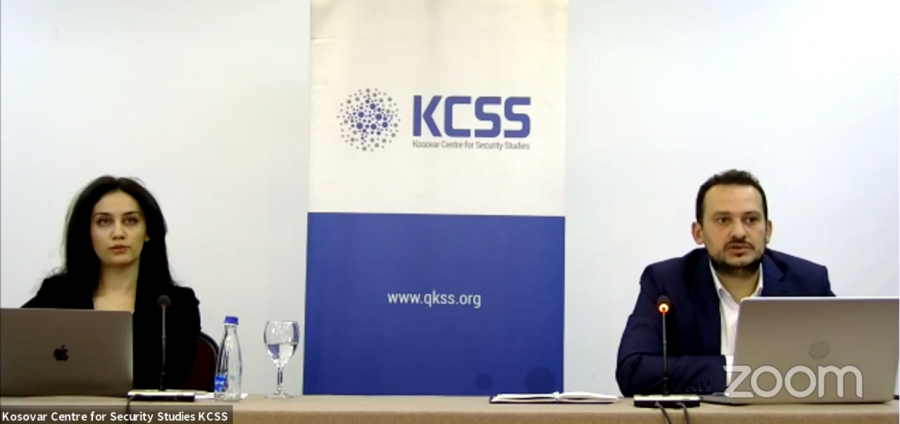28/12/2020

Kosovar Centre for Security Studies (KCSS) published today the report “Between a Rock and a Hard Place: Kosovo’s Challenges in Dealing with the COVID-19 Pandemic” which provides an overview of Kosovo’s legal and strategic framework in emergency response and crisis management, including roles of key institutions involved in emergency planning and response.
Specifically, it focuses on Kosovo’s response to the COVID-19 pandemic and its impact on various dimensions on citizens’ lives, including political ramifications, security implications and socio-economic uncertainties. The COVID-19 pandemic presents the first large-scale crisis that Kosovo’s fledging institutions have faced. Although the COVID-19 is still an ongoing development in Kosovo and beyond, a number of key findings stand out already at this stage.
The report finds that COVID-19 has exposed vulnerabilities in the security sector, especially in the cyberspace – leading to an increase in cyberattacks. Disinformation has also proliferated - according to a KCSS survey, 33.83% of the respondents revealed that they had doubts about the existence of the COVID-19 pandemic, and this was slightly more prevalent among Kosovo Serb respondents. This level of skepticism certainly makes it difficult to efficiently implement measures to protect the health of the citizens and poses a serious threat to public health. COVID- 19 has impacted rule of law, but it was mostly used as an excuse for lack of results in dealing with cases of corruption and organized crime, which are linked to systematic inefficiencies and impunity.
This study demonstrates that most of the measures taken by Kosovo Government have had a limited success in bringing COVID-19 under control due to lack of prior planning in emergency preparedness and response, further exacerbated by an ongoing political crisis. Among key challenges highlighted by the report include shortcomings in the legal framework, ambiguities in roles and responsibilities of stakeholders involved, outdated strategic framework to deal with emergencies, lack of a clear legal basis for government decisions, first responders’ limited resources and staff capacities, low public trust in the institutions, allegations of mismanagement and discrimination for provision of public health services, lack of transparency in the decision- making process and a lack of a clear and consistent communication strategy with the public.
Hence, Kosovo’s scorecard is a mixed bag of early successes, avoidable failures and numerous flaws, often leaving citizens confused and to their own devices. At the height of the second wave of the pandemic, Kosovo is governed by an acting President and a caretaker government with a pending election process that is likely to further distract Kosovo authorities from an effective and focused response to the ongoing pandemic as well as to delay country’s vaccine purchase and distribution plan.
This report puts forward a number of recommendations, including that the government should prioritize public health and intensify efforts to secure the COVID-19 for the citizens of Kosovo, increase levels of transparency, review existing laws related to emergencies, update the currently outdated strategic framework, conduct regular and cross-sectoral risk assessments under the coordination of a separate institutional body and strengthen cooperation with international partners and organizations.
Report dhe video recording can be found below:
Between a rock and a hard place: Kosovo's challenges in dealing with the COVID-19 Pandemic
Note: The conference for the publication of this report was organized in full compliance with the decisions and recommendations of health institutions and the Government of Kosovo for social distance and hygiene, due to the situation with the pandemic Covid-19.
This publication has been produced with the support of The Balkan Trust for Democracy in the framework of the project "COVID-19: Emergency preparedness and crisis management in Kosovo". Opinions expressed in this publication do not necessarily represent those of the Balkan Trust for Democracy, the German Marshal Fund of the United States, or its partners.